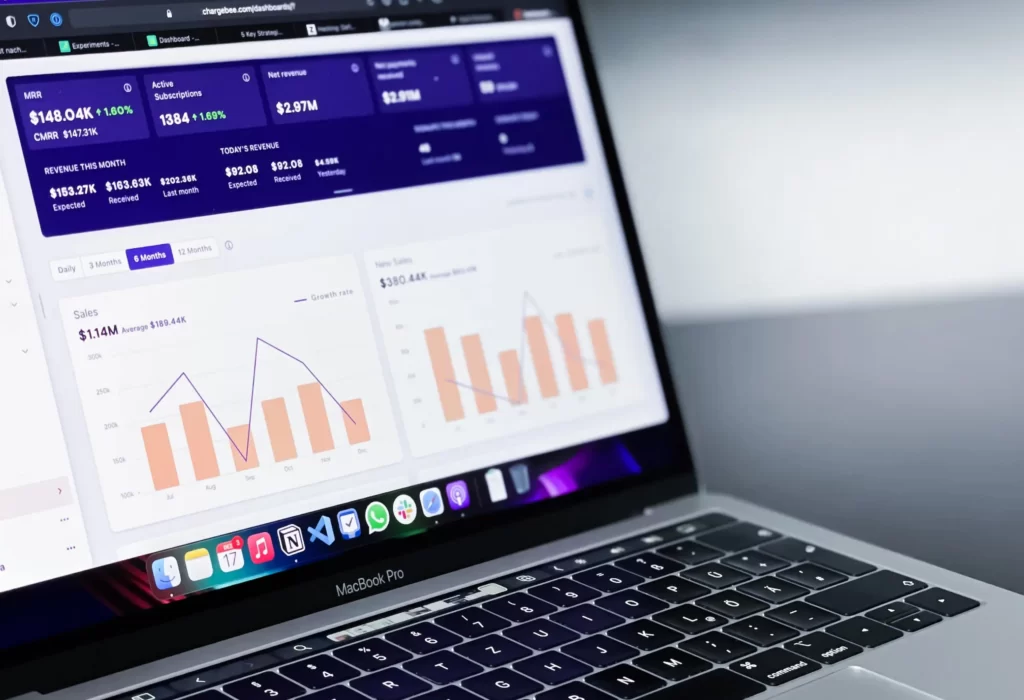
How to Find the Benchmark for SEO Organic Traffic in GA4
Investing in SEO but not sure if it’s actually working? You’re driving organic traffic to your site, but how do you measure its impact without


Table Of Contents
Backlinks, also known as inbound or incoming links, are hyperlinks that direct users from one website to another. These links serve as digital endorsements, signaling to search engines that your content is valuable, credible, and worth referencing.
In the context of SEO, backlinks play a critical role in determining a website’s authority and ranking on search engine results pages (SERPs). When a reputable website links to your site, this backlink acts as a bridge that connects your websites, helping search engines assess the relevance and trustworthiness of your content in the vast digital landscape.

Backlinks are a cornerstone of SEO because they directly influence how search engines perceive your website’s authority and relevance. When high-quality websites link to your content, it sends a signal to search engines like Google that your site provides valuable and trustworthy information. This can boost your search rankings, making your website more likely to appear at the top of search engine results pages (SERPs).
Additionally, backlinks contribute to your domain authority (DA), a metric that reflects the overall strength and credibility of your website. A higher DA typically correlates with better rankings.
However, not all backlinks are created equal—links from reputable, authoritative sources carry more weight than links from low-quality or spammy sites. As a result, a strong backlink profile can significantly enhance your site’s online visibility, driving organic traffic and improving your overall SEO performance.
Not all backlinks are created equal; their type and quality significantly impact your website's SEO performance. The two primary types of backlinks are dofollow and nofollow. Dofollow links pass on "link equity," or SEO value, from the referring website to yours, directly contributing to your domain authority and search engine rankings. “No follow” links, on the other hand, include a special attribute that tells search engines not to pass link equity. While nofollow links don't directly impact rankings, they can still drive traffic and build brand visibility, making them valuable in other ways.
The quality of backlinks is just as important as their type. High-quality backlinks come from authoritative, reputable websites that are relevant to your niche. These links are highly beneficial because search engines view them as trustworthy endorsements.
Low-quality backlinks, such as those from spammy, irrelevant, or poorly maintained sites, can harm your SEO and even lead to penalties. Building a diverse and high-quality backlink profile—focused on dofollow links but inclusive of some nofollow links—ensures a balanced and effective approach to link building.
High-quality backlinks are the gold standard for boosting your website’s SEO, but identifying them requires evaluating several key factors. First, relevance is crucial—a backlink from a website within your niche or industry is far more valuable than one from an unrelated site. Search engines interpret relevant links as a sign that your content aligns with the interests of your audience and the referring site’s users.
Next, authority is a critical metric. Backlinks from authoritative websites—those with high domain authority, trustworthiness, and a strong online presence—carry more weight. These sites are often recognized as leaders in their field and can significantly boost your credibility in the eyes of search engines.
Finally, placement within the linking site matters. Backlinks embedded in the main content of a page, such as in an article or blog post, are more impactful than links buried in footers, sidebars, or comment sections. Search engines prioritize links that are naturally integrated into the content because they are perceived as more genuine and relevant. By focusing on these factors, you can build a strong, high-quality backlink profile that drives lasting SEO benefits.

Building a robust backlink profile requires a combination of strategic approaches tailored to your website’s goals and niche. Here are some of the most effective strategies for acquiring high-quality backlinks:
Outreach involves reaching out to relevant websites or content creators to request backlinks. This strategy works well when you have high-value content, like in-depth articles, infographics, or tools, that others would find beneficial to link to. Personalization is key—craft tailored messages that explain why your content adds value to their audience.
Guest blogging allows you to contribute content to other websites in your niche in exchange for a backlink to your site. To find guest blogging opportunities, platforms like GuestPost.com or WriteForUs.org can connect you with websites seeking contributors. Focus on reputable sites with engaged audiences and ensure your content is high-quality to maximize impact.
This strategy involves identifying broken links on reputable websites and offering your content as a replacement. Tools like Check My Links and Ahrefs can help you find broken links, making it easier to pitch your content as a solution. This approach is mutually beneficial: you get a backlink, and the website fixes a dead link.
While earning backlinks organically is ideal, some businesses opt to purchase backlinks. If you choose this route, ensure you work with reputable providers to avoid low-quality or spammy links. Platforms like LinksManagement or Authority Builders offer a-la-carte backlink options, allowing you to select placements on high-quality sites. However, proceed with caution, as search engines may penalize sites with unnatural link profiles.
If managing backlinks feels overwhelming, outsourcing to a professional backlink manager can save time and ensure quality. Agencies like Tona Designs specialize in backlink strategies, helping businesses secure high-quality links through ethical and effective practices. Whether it’s through outreach, content creation, or link audits, Tona Designs provides a boutique service that aligns with your overall digital marketing strategy.
By leveraging these strategies and tools, you can build a diverse and high-quality backlink profile that enhances your website’s authority, drives organic traffic, and strengthens your overall SEO efforts.

Building a strong backlink profile is essential for SEO success, but taking the wrong approach can do more harm than good. Here are some common backlinking mistakes to avoid:
Link farms are networks of websites created solely for the purpose of generating backlinks. While these links may boost your numbers temporarily, search engines like Google actively penalize sites that use such tactics. Links from these sources are often low-quality, irrelevant, and can damage your domain authority.
While buying backlinks may seem like a quick fix, purchasing links from low-quality or spammy websites can lead to severe penalties. Platforms that sell cheap links often provide little to no value and may flag your site for manipulative practices. If you decide to purchase backlinks, prioritize high-quality providers and ethical practices.
Using keyword-stuffed anchor text for backlinks can make your link profile look unnatural to search engines. Instead, aim for a mix of branded, generic, and natural anchor text that aligns with your content. Over-optimization is a red flag and can lead to penalties for trying to manipulate rankings.
A backlink from a high-authority site is valuable only if it’s relevant to your content. Irrelevant links confuse search engines and dilute your backlink profile. Always prioritize links from websites that align with your niche or industry.
Failing to monitor your backlink profile can leave your site vulnerable to harmful or spammy links. Regularly audit your backlinks using tools like Ahrefs, SEMRush, or Google Search Console to identify and disavow low-quality or harmful links.
A large number of backlinks might seem impressive, but quality always trumps quantity. A few high-quality, authoritative links are far more beneficial than dozens of low-quality links.
Avoiding these mistakes ensures your backlinking efforts remain ethical, effective, and aligned with search engine guidelines, helping to build a strong and sustainable SEO foundation.
Anchor text—the clickable text in a hyperlink—plays a crucial role in determining the value and effectiveness of a backlink. Search engines use anchor text as a contextual signal to understand the linked content’s topic and relevance. When done strategically, anchor text can boost a website’s search engine rankings by associating the linked page with targeted keywords.
However, not all anchor text is created equal. A balanced approach is key to maximizing its impact while avoiding penalties. For example:
Using a diverse mix of anchor text types ensures your backlink profile remains natural and avoids over-optimization. Additionally, the placement of anchor text within relevant, high-quality content enhances its value. When strategically managed, anchor text can amplify the power of your backlinks and contribute significantly to your SEO success.

A well-maintained backlink profile is essential for sustaining your website’s SEO performance. Regular monitoring ensures that your links remain high-quality and free from harmful connections that could damage your rankings. Here are tools and techniques to effectively audit and maintain your backlink profile:
Tools like Ahrefs, SEMRush, and Moz Link Explorer are invaluable for tracking your backlinks. They provide insights into the quantity, quality, and origin of your links, helping you identify potential issues or opportunities. Google’s Search Console is another essential (and free) tool for monitoring backlinks and ensuring your site aligns with search engine guidelines.
A backlink audit involves reviewing all the links pointing to your site to identify low-quality or harmful links. These could include links from spammy websites, irrelevant sources, or pages with thin or duplicate content. Regular audits ensure that your backlink profile remains clean and authoritative.
If you discover links that could harm your site, such as those from link farms or spammy sites, use Google’s Disavow Tool to tell search engines to ignore them. While disavowing links should be a last resort, it’s an effective way to protect your site from penalties caused by bad backlinks.
Backlinks can be lost if the linking site removes the page or alters the link. Use tools like Ahrefs’ Lost Backlink Report to identify and recover these links. Reach out to the site owner and request that they restore the link or update it to a relevant page on your site.
A healthy backlink profile includes a mix of links from authoritative sites across various domains. Avoid relying too heavily on one source, as this can appear unnatural to search engines.
The SEO landscape is constantly evolving, and backlinking strategies change over time. Stay informed about best practices, algorithm updates, and industry trends to ensure your backlink profile remains competitive.
By regularly monitoring and maintaining your backlinks, you can safeguard your SEO efforts, enhance your website’s authority, and ensure long-term success in search engine rankings.
To build a strong backlink profile and improve your website's SEO, tracking key metrics is essential. These metrics provide insights into the quality, relevance, and impact of your backlinks. Here are the most important backlink metrics to monitor:
Domain Authority, developed by Moz, measures the overall strength of a website on a scale from 1 to 100. Websites with higher DA are more authoritative, and backlinks from such sites are more valuable. While DA doesn’t directly affect search engine rankings, it’s a reliable indicator of the potential impact of a backlink.
Page Authority, also a Moz metric, evaluates the strength of a specific page rather than the entire domain. A backlink from a high-PA page can significantly boost the credibility of your linked content. Monitoring both DA and PA helps you prioritize the quality of your backlink sources.
Referring domains are the unique websites linking to your site. Having a diverse range of referring domains indicates a strong and natural backlink profile. Multiple links from the same domain are valuable, but acquiring links from new, authoritative domains signals to search engines that your content is widely trusted.
Tracking the total number of backlinks provides a general overview of your link-building progress. However, focus on quality over quantity; a few high-quality backlinks outperform a large number of low-quality ones.
Relevance measures how closely the linking site’s content aligns with your niche or industry. Backlinks from relevant websites carry more weight and improve the perceived value of your content.
Monitoring the anchor text of your backlinks ensures a natural distribution. A mix of branded, generic, and keyword-rich anchor text helps you avoid over-optimization penalties while maintaining a healthy backlink profile.
Not all backlinks are created purely for SEO—some drive direct traffic. Use tools like Google Analytics to measure how much referral traffic you’re receiving from your backlinks. Links that send traffic in addition to SEO benefits are especially valuable.
By regularly tracking these metrics with tools like Ahrefs, SEMRush, or Moz, you can evaluate the health of your backlink profile, identify areas for improvement, and ensure your efforts are driving measurable SEO success.
As search engines continue to evolve, so do the strategies for effective backlinking. In 2025, quality and relevance remain at the forefront of backlinking, but new trends and best practices are shaping the way businesses build and maintain their link profiles. Here are the key trends and strategies for successful backlinking in 2025:
Search engines have become increasingly sophisticated at analyzing the context and quality of backlinks. Backlinks from websites with high-quality, relevant content are more valuable than ever. Creating comprehensive, authoritative, and engaging content ensures that other sites will naturally want to link to you.
AI-powered tools are transforming the way backlinks are identified and acquired. Platforms like ChatGPT, Surfer SEO, and Linkhunter now assist in identifying link opportunities, crafting outreach emails, and analyzing link profiles more efficiently than traditional methods.
With Google’s emphasis on E-E-A-T, backlinks from sites that demonstrate expertise, authority, and trustworthiness are prioritized. Building relationships with credible industry publications, expert blogs, and professional organizations is a key strategy in 2025.
The focus is shifting from purely technical SEO to user-first strategies. Backlinks placed in relevant, helpful contexts—such as within well-researched articles, tutorials, or guides—are valued more highly by search engines. Unnatural tactics, like over-optimized anchor text or irrelevant placements, are penalized.
Search engines reward backlink profiles that appear organic and diverse. In 2025, businesses are focusing on earning links from a wide range of sources, including industry blogs, forums, news sites, and niche communities. The goal is to create a balanced profile that mimics natural linking behavior.
While dofollow links still hold significant weight, nofollow and UGC (User-Generated Content) links are gaining traction as valuable indicators of trust. Search engines increasingly view these links as part of a natural backlink profile and reward their presence when paired with high-quality content.
With the rise of localized search and niche markets, backlinks from local directories, community blogs, and region-specific publications are becoming more impactful. These links enhance a website’s relevance to its target audience and geographic area.
Collaborations like co-authoring articles, hosting joint webinars, or sponsoring events provide opportunities for earning backlinks while building meaningful industry relationships. These partnerships also align with the push toward authentic, high-value link building.
Going into 2025 if you are working on creating valuable backlinks for your website, you need to be sure you are following best practices to not harmful affect your Domain Authority (DA) or SEO performance. Be sure to follow these best practices during your backlink campaigns:
By adopting these trends and adhering to best practices, businesses can build a sustainable, high-impact backlink profile that aligns with the evolving SEO landscape in 2025.
Now that we've laid the groundwork for understanding backlinks, let's explore some essential do's and don'ts when it comes to building an effective backlink strategy:
Create High-Quality Content: This is the foundation of any successful backlink strategy. Your content should be informative, engaging, and valuable to your target audience.
Build Relationships: Foster genuine relationships within your industry. Networking with influencers and other website owners can lead to valuable backlink opportunities.
Diversify Your Backlinks: Aim for a diverse portfolio of backlinks, including different types and sources. This makes your link profile appear more natural to search engines.
Monitor Your Backlinks: Regularly check the quality and relevance of your backlinks. Disavow toxic or spammy links to maintain a healthy link profile.
Engage in Link Schemes: Avoid participating in link schemes or buying links. These practices can lead to severe penalties from search engines.
Overuse Exact Match Anchor Text: Using the same keyword-rich anchor text excessively can trigger red flags. Vary your anchor text to maintain a natural link profile.
Neglect On-Page SEO: Backlinks are just one part of the SEO puzzle. Ensure your on-page SEO elements, such as meta tags and content optimization, are also in top shape.
Backlinks are the lifeline of SEO, and understanding their intricacies is essential for achieving higher search engine rankings. Crafting a robust backlink strategy that emphasizes quality over quantity, fosters relationships, and aligns with best practices will undoubtedly propel your website to new heights in the digital landscape.
Remember, SEO is a dynamic field, and staying updated with the latest trends and algorithms is key to maintaining your website's success. By mastering the art of backlink building, you're well on your way to dominating the SERPs and driving organic traffic to your site.
In summary, backlinks are the lifeblood of SEO's off-page strategy. They serve as powerful endorsements of your website's quality and relevance in the digital landscape. As search engines continue to evolve, backlinks remain a crucial element in gaining visibility and credibility.
For those willing to invest time and effort in building quality backlinks, the rewards are significant. By understanding the intricacies of off-page SEO and employing best practices, you can propel your website to new heights.
Look for websites in your niche or industry that accept guest posts. You can use search engines, social media, or specialized platforms.
No, buying backlinks is against search engine guidelines and can result in penalties. Focus on natural link-building methods.
Tools like Ahrefs and Moz offer comprehensive backlink analysis and monitoring features.
It's advisable to conduct a link audit at least once every few months to ensure your backlinks remain high-quality and relevant.
Anchor text helps search engines understand the context of the link. Using relevant and varied anchor text is crucial for SEO.
Other Powerful Reads
Digital Marketing Blog

How to Find the Benchmark for SEO Organic Traffic in GA4
Investing in SEO but not sure if it’s actually working? You’re driving organic traffic to your site, but how do you measure its impact without

WordPress vs. Squarespace: Choosing the Right Platform for Your Business Website
Introduction to WordPress and Squarespace Struggling to decide which website platform fits your business goals and budget? Let’s break it down. When it comes to

The Top 40 Attorney Websites on The Internet
Why Is A Website Important For Lawyers? If you own a law firm in 2025, having an optimized law firm website is a necessity. With
We specializes in creating captivating and functional websites, enabling businesses to enhance your online presence and effectively communicate your brand’s story through an exceptional user experience
Tona Designs © 2025 All Rights Reserved | Fulfillment Policy | Privacy Policy | Terms of Service
We have successfully received your form submission. Our team will reach out to you shortly with next steps. Feel free to browse our website in the meantime!